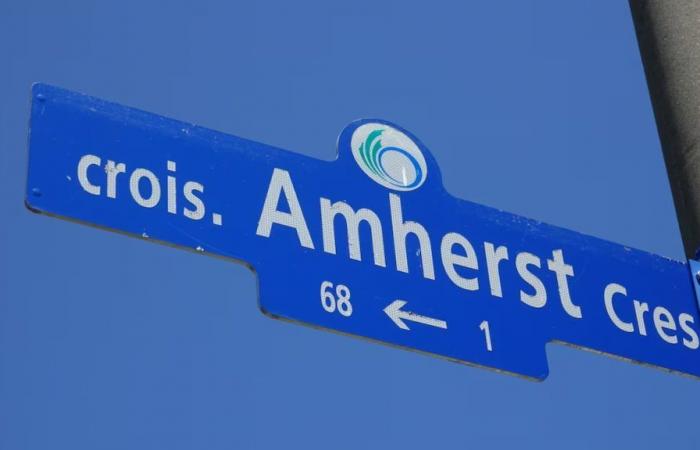The City of Ottawa is set to adopt a new naming policy in an effort to commemorate a more diverse range of Ottawans without being subject to targets or quotas.
The general director of the City’s Recreation, Culture and Facilities Services, Dan Chenier, explained that a new working group would select applications from the public who represent the community in a more balanced way
.
Open in full screen mode
Dan Chenier, Director General of Leisure, Culture and Facilities Services for the City (Archive photo)
Photo : CBC/Matthew Kupfer
Ottawa’s Community Services Committee approved the new policy Wednesday, and it will go to the full council for final approval next month.
For the municipal councilor of the Rideau-Rockcliffe district, Rawlson Kingit should make it possible to remedy historical inequalities.
Open in full screen mode
Rawlson King, city councillor for Rideau-Rockcliffe ward (File photo)
Photo : Radio-Canada / Guy Quenneville
If adopted, the new naming policy will place greater emphasis on recognizing local Ottawans, while prioritizing inclusion and equitable representation of communities and cultures
as well as consultation with indigenous groups.
To ensure equality and inclusiveness in the future, the policy states that names received from the Algonquin Anishinabeg Nation and names representing groups experiencing a lack of equity will be given priority consideration.
we can read in a municipal staff report.
These groups include women and newcomers, as well as racialized, Francophone and LGBTQ.
Mr. Chenier also specified that the working group will be responsible for examining the requests to prevent them from honoring people likely to bring disgrace to the city.
What we want to avoid are situations where the reputation of the City or an establishment is tarnished by an association that does not reflect the City’s values.
The policy explicitly excludes names that are discriminatory or derogatory with respect to race, color, ethnicity, gender identity or expression, sex, sexual orientation, creed, affiliation politics, disability or other social factors
.
The name change is not the only solution
The municipal councilor for the Somerset district, Ariel Trosterasked if residents could use the new policy to challenge a name already honored in a municipal facility.
Open in full screen mode
Somerset Ward Councilor Ariel Troster (File photo)
Photo : Radio-Canada / Elyse Skura
The City’s Director General of Recreation, Culture and Facilities Services responded that they could propose renaming the place differently, following the same process as for naming municipal infrastructure. He added that the working group would assess the merits of such a request by examining facts
in order to take evidence-based decisions
based on historical research.
We will ask the requester to explain their concerns, then we will research and discuss our findings.
Mr. Chenier says he is fully aware that figures associated with residential schools for Native people or slavery are likely to be presented. He added that he could not yet predict precisely how these cases will be handled.
We don’t know yet how this will happen, because changing the name is not the only solution. Explaining and putting in context are also other options that our working group could recommend. It is therefore too early to answer.
Open in full screen mode
The Sir John A. Macdonald Parkway was renamed Kichi Zībī Mīkan by the National Capital Commission in 2023. (Archive Photo)
Photo : Radio-Canada / Jean Delisle
Mme Comforts questioned why the City is not proactively seeking to eliminate offensive or outdated names across Ottawa.
We have seen a wave of protests across the country and abroad, leading to the toppling of monuments and the changing of names
she recalled. Incredible action was taken to rename what is now the Kichi Zībī Mīkan Promenade.
Mr. Chenier, however, explained that the new toponymic naming policy did not go that far and would instead be based on community requests.
Group wants gender parity target
Representatives of a group called Prominent Women of Ottawa (Ottawa Distinguished Women) responded to councilors that the policy did not go far enough to correct the current imbalance in appointments by not including any targets.
We believe that this policy must go even further.
judged Lee Farnworth. % of all toponymic names.”,”text”:”We think it should have objectives. Fifty percent women should correspond to 50% of all toponymic names.”}}”>We think it should include objectives. Fifty percent women should correspond to 50% of all toponymic names.
According to Ms. Farnworthless than 10% of the City’s facilities, parks and streets bear the name of a woman, while, according to Mr. Chenier, this figure is more like 22%.
The representative for Distinguished Women of Ottawa says her organization has a list of women to honour long enough to help the city reach the 50 per cent goal.
The councilor of the Baie district, Theresa Kavanaghasked Mr. Chenier to ensure that the composition of the working group was at least equal between men and women.
The working group will not have the final say on the name change, however. For minor infrastructure, such as baseball fields or outdoor rinks, Mr. Chenier would play a key role and would also seek approval from the neighborhood municipal councilor and community associations. For larger assets, such as large parks, theaters and indoor swimming pools, the city council would have the final say.
With information from Arthur White-Crummeyof CBC News






